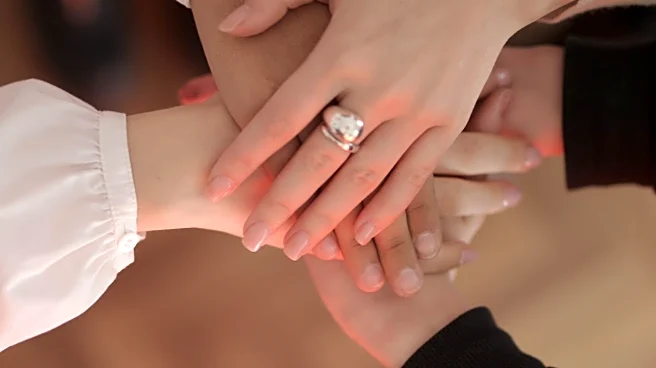What is the story about?
What's Happening?
Chronic urticaria, commonly known as chronic hives, is a condition characterized by persistent itchy welts on the skin. It can be triggered by environmental factors or occur spontaneously without an identifiable cause, known as chronic spontaneous urticaria (CSU). The condition not only affects physical health but also has significant mental health implications, leading to anxiety, depression, and panic attacks. Despite its prevalence, awareness and recognition of chronic urticaria remain low. To address this, support groups have emerged as vital resources for those affected. These groups provide a platform for sharing experiences, treatment tips, and emotional support. Both in-person and online support groups are available, with platforms like Facebook hosting private groups specifically for women and CSU patients. These groups emphasize a combination of traditional and holistic approaches to managing the condition.
Why It's Important?
The existence of support groups for chronic urticaria is crucial as they offer a sense of community and understanding for individuals who often feel isolated due to their condition. The mental health impact of chronic urticaria can be profound, and having a support network can alleviate some of the psychological burdens. These groups also serve as a source of information and empowerment, helping members explore various treatment options and coping strategies. As awareness of chronic urticaria increases, these support networks can play a pivotal role in improving the quality of life for sufferers, particularly women who are disproportionately affected. The emphasis on both medical and holistic treatments reflects a growing trend towards integrated healthcare approaches.
What's Next?
As awareness of chronic urticaria grows, it is likely that more support groups will form, both online and offline, providing greater access to resources and community support. Healthcare professionals may increasingly recommend these groups as part of a comprehensive treatment plan. Additionally, ongoing research into the causes and treatments of chronic urticaria could lead to new therapies, which support groups can help disseminate to their members. The celebration of events like World Urticaria Day can further raise awareness and encourage more individuals to seek support.
Beyond the Headlines
The rise of support groups for chronic urticaria highlights a broader societal shift towards recognizing and addressing the mental health aspects of chronic physical conditions. This development underscores the importance of holistic healthcare that considers both physical and psychological well-being. The integration of traditional and alternative medicine within these groups reflects a growing acceptance of diverse treatment modalities, which could influence future healthcare practices.
















